
Welcome to the definitive guide on selecting the best laptop for Assassin's Creed: Mirage. As an avid gamer and laptop enthusiast, I've spent countless hours delving into the world of Assassin's Creed, navigating the historic landscapes and experiencing the thrill of unraveling its gripping narrative. Now, I'm here to help you in your quest for the ideal gaming machine that will not only meet but exceed the demands of this visually stunning and performance-intensive game.
Assassin's Creed: Mirage, like its predecessors, is an impressive fusion of immersive storytelling, detailed environments, and intense action sequences. It's a game that demands a robust system capable of rendering its complex graphics and fast-paced combat, while maintaining smooth performance. Therefore, finding the best laptop for Assassin's Creed: Mirage is no simple task. It requires a deep understanding of the game's unique requirements, including the need for a high-refresh-rate display for seamless gameplay, a powerful GPU to support its high-fidelity visuals, and a robust cooling system to keep performance at peak even during the most intense gaming sessions.
In my laptop selection process, I've scoured an extensive laptop spreadsheet, comparing the specs and reviews of recent releases. I've taken into account both professional and user-generated reviews, and whittled down the list based on Assassin's Creed-specific requirements and various price ranges. This guide is not just about raw power, but also about ensuring optimal gameplay experience, whether you're stealthily skulking in the shadows or engaging in fierce combat in the vibrant world of Assassin's Creed: Mirage.
Unlock the Power: Choosing the Right Processor
Gaming Laptop Processor Market Overview
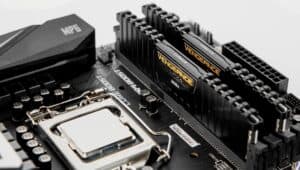
When it comes to choosing the right laptop processor for gaming, there are several options to consider. With Apple's ARM-based M-series processors making waves and AMD gaining a foothold in the market, there are plenty of choices for gamers.
Is a High-End CPU Needed for Gaming?
For Assassins Creed: Mirage, a mid-range CPU will suffice, as the game is not particularly demanding. It won't bottleneck the GPU much, allowing you to enjoy smooth gameplay without investing in an expensive high-end processor.
However, if you're looking for a gaming laptop that can handle other games well, I'd recommend going for an H-series processor (or at least an AMD P-series). These processors offer better performance and are ideal for gaming enthusiasts who want to play a variety of titles without compromising on power.
Are You Planning to Upgrade the CPU Later?
Another factor to consider is whether you plan on upgrading your CPU in the future. Some laptops allow for CPU upgrades, while others do not. If upgradability is important to you, make sure to choose a laptop that supports CPU upgrades.
Best Chips for Gaming and Average Laptop Price
To make your decision easier, I've compiled a list of the best processors for gaming laptops, along with their average prices. Keep in mind that prices may vary depending on the specific laptop model and configuration.
| Processor | Average Price Range |
|---|---|
| i5-11320H | $600 – $800 |
| Ryzen 5 5600U | $800 – $1000 |
| i5-12450H | $1000 – $1500 |
Recommended Processors by Price Bracket
Here are my recommendations for each price bracket:
Minimum Price Bracket ($600 – $800): The i5-11320H offers excellent performance for its price range. It provides enough power to handle gaming and other tasks without breaking the bank.
Recommended Price Bracket ($800 – $1000): The AMD Ryzen 5 5600U is a great choice in this price range. It offers impressive performance and power efficiency, making it ideal for gaming on the go.
High-End Price Bracket ($1000 – $1500): If you're willing to invest a bit more, the i5-12450H is an excellent option. With its powerful performance, you'll be able to tackle demanding games with ease.
Remember, these recommendations are based on the current market trends and may change over time. Before making a final decision, I recommend checking the latest performance benchmarks for any potential laptop purchase, such as PassMark and Cinebench scores. These benchmarks provide valuable insights into how well the CPU will perform in real-world scenarios.
Keep in mind that if you want to play other demanding titles at 60+ FPS, you'll need additional features such as an Nvidia G-Sync or AMD FreeSync display panel, a high refresh rate display panel, and a beefy graphics card. However, if you're okay with 30+ FPS, you can get away with a mid-range CPU without sacrificing too much in terms of battery life or heat management issues.
With these considerations in mind, you'll be well-equipped to choose the right laptop processor for Assassins Creed: Mirage and enjoy a smooth gaming experience.
Unleash the Power: Choosing the Perfect Graphics Card
What's new in the GPU market

In the ever-evolving world of laptop graphics cards, Nvidia continues to dominate the market. While their recently released RTX 40 series cards are starting to make their way onto store shelves, the majority of laptops still feature the popular RTX 30 series GPUs. It's worth noting that desktop GPUs have become more power-hungry, creating a wider gap between notebook and desktop graphics performance.
Additionally, Nvidia has discontinued the Max-Q label for their RTX graphics cards. This means that laptop manufacturers now determine the exact wattage for each GPU, resulting in a significant variance in graphics performance even among laptops with the same GPU chipset.
How does a graphics card affect your gaming experience (in AC)?
When it comes to playing Assassins Creed: Mirage on a laptop, the graphics card is not as crucial as it used to be. Ubisoft has made great strides in optimizing the game's performance by relying less on the GPU and more on the CPU. This is great news for gamers, as it means you can achieve a smooth gameplay experience without necessarily needing the most powerful GPU on the market.
When should you get a high-end GPU?
While a high-end graphics card may not be a necessity for playing Assassins Creed: Mirage, there are still situations where investing in one can enhance your gaming experience. If you enjoy playing other graphically intensive games or plan to use your laptop for tasks such as video editing or 3D rendering, a high-end GPU can provide the necessary horsepower to handle these demanding tasks. Additionally, a high-end GPU can future-proof your laptop, ensuring that it remains capable of running upcoming games and software releases.
How I rate GPUs (performance, thermals, power consumption)
When evaluating and comparing different GPUs, I primarily rely on performance benchmarks such as 3DMark. However, it's important to note that these tests may not be ideal for comparing laptops with different display resolutions and refresh rates. The choice of display can significantly impact the GPU's performance in real-world gaming scenarios.
Aside from performance, I also consider factors such as thermals and power consumption. A graphics card that runs cool and efficiently not only prolongs the lifespan of your laptop but also ensures a quieter and more comfortable gaming experience.
List of recommended GPUs for gaming laptops by budget category
Here is a list of recommended GPUs for playing Assassins Creed: Mirage on a laptop, categorized by budget:
| Budget | Recommended GPU |
|---|---|
| Minimum | GeForce RTX 3050 |
| Recommended | GeForce RTX 3060 |
| High-end | GeForce RTX 2080 SUPER |
Please note that these recommendations are based on the current market availability and may change over time. Additionally, it's important to consider other components such as RAM and storage capacity when choosing a gaming laptop, as these can also impact overall performance.
In conclusion, while the choice of graphics card is important, Ubisoft's optimization efforts have made it possible to enjoy Assassins Creed: Mirage on a wide range of laptops. Whether you're on a tight budget or looking for the best performance money can buy, there are options available to suit your needs. Happy gaming!
Level up your gaming with killer RAM!
Gaming RAM landscape
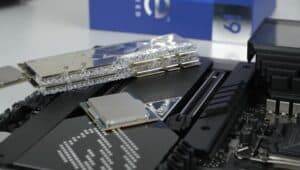
When it comes to gaming laptops, RAM is an essential component that shouldn't be overlooked. While it may not be as crucial as it once was, it still plays a significant role in ensuring smooth gameplay and multitasking capabilities. So, how much RAM do you really need for gaming?
How much memory is needed for gaming?
For most gamers, 16 GB of RAM is the sweet spot. This amount of memory allows you to run your games smoothly while simultaneously having other applications running in the background. Whether you're streaming gameplay, video editing, or running resource-intensive applications, 16 GB will generally be sufficient.
DDR5 – is it worth the money?
With the latest-generation Intel and AMD CPUs supporting both DDR4 and DDR5, you might be wondering if it's worth investing in DDR5 memory. While DDR5 does offer some improvements over DDR4, such as increased bandwidth and potential for higher clock speeds, it's still relatively new and comes with a higher price tag. Additionally, DDR5 technology needs time to mature and become more affordable.
If you're not looking to invest in a high-end gaming laptop that can handle anything thrown at it, sticking with DDR4 memory can save you some money without sacrificing performance significantly.
Why I don't pay much attention to benchmarks
While benchmarks can provide valuable insights into a component's performance, they often fail to capture real-world usage scenarios accurately. That's why I believe it's more important to consider the practical requirements of your specific use case, rather than solely relying on benchmark numbers.
Gaming, in particular, relies on a combination of factors such as CPU, GPU, and RAM. Therefore, it's essential to strike the right balance between these components to achieve the best gaming experience.
Table of recommended RAM configurations
Here's a table outlining the recommended RAM configurations based on different price brackets:
| Price Bracket | Recommended RAM |
|---|---|
| Minimum | 16 GB |
| Recommended | 32 GB |
| High-end | 64 GB |
These recommendations should give you a good starting point when deciding on the right laptop RAM for Assassins Creed: Mirage. Remember, these recommendations are not set in stone, and you can always adjust them based on your specific needs and budget.
In conclusion, while RAM may not be the make-or-break factor for gaming performance, it still plays an important role in ensuring smooth gameplay and multitasking capabilities. By considering the amount of memory you need and weighing the cost-benefit of DDR5, you can make an informed decision when choosing the right laptop RAM for Assassins Creed: Mirage.
Unmasking the Mysteries: Your Mirage Laptop FAQs Answered
Q: What are the system requirements for Assassins Creed: Mirage on a laptop?
The system requirements for Assassins Creed: Mirage on a laptop vary depending on the desired performance level. Here are the minimum, medium, and maximum requirements:
Minimum Requirements:
- Processor: Intel Core i5-11320H
- Graphics: NVIDIA GeForce RTX 3050
- Memory: 16 GB
Medium Requirements:
- Processor: AMD Ryzen 5 5600U
- Graphics: NVIDIA GeForce RTX 3060
- Memory: 32 GB
Maximum Requirements:
- Processor: Intel Core i5-12450H
- Graphics: NVIDIA GeForce RTX 2080 SUPER
- Memory: 64 GB
Please note that these requirements may change over time as the game is updated and optimized.
Can I play Assassins Creed: Mirage on a laptop?
Yes, you can play Assassins Creed: Mirage on a laptop. The game is designed to be compatible with various laptop configurations, ranging from minimum to maximum requirements. However, the performance and visual quality will depend on the specifications of your laptop. For a smooth gaming experience, it is recommended to meet or exceed the recommended requirements.
What is the best laptop for Assassins Creed: Mirage?
The best laptop for Assassins Creed: Mirage depends on your budget and performance expectations. Here are some recommended laptops:
- HP Victus 15 ($880)
- ASUS TUF Dash F15 (Price Varies, around $1600)
- Lenovo Legion Pro 5 ($2,630)
- Lenovo Legion Pro 7i 16 ($3,390)
These laptops offer a balance between price and performance, providing an enjoyable gaming experience for Assassins Creed: Mirage. However, keep in mind that technology evolves quickly, so it's essential to check for the latest laptop models and specifications.
How to choose a laptop for Assassins Creed: Mirage?
When choosing a laptop for Assassins Creed: Mirage, consider the following factors:
-
Processor: Look for a laptop with a powerful processor, such as the Intel Core i5-11320H, AMD Ryzen 5 5600U, or Intel Core i5-12450H. These processors provide the necessary speed and performance for gaming.
-
Graphics: Opt for a laptop with dedicated graphics, preferably a NVIDIA GeForce RTX 3050, RTX 3060, or RTX 2080 SUPER. Dedicated graphics cards deliver smooth gameplay and enhanced visuals.
-
Memory: Ensure your laptop has sufficient memory, with a minimum of 16 GB. For better performance, consider laptops with 32 GB or even 64 GB of RAM.
-
Budget: Set a budget based on your financial capabilities and gaming requirements. There are options available at various price points, so choose the one that meets your needs without breaking the bank.
-
Display: Look for a laptop with a high-resolution display and a fast refresh rate. A screen with at least Full HD resolution (1920×1080) and a refresh rate of 144Hz or higher will enhance your gaming experience.
-
Storage: Consider laptops with solid-state drives (SSDs) for faster loading times and smooth gameplay. A minimum of 512 GB of storage is recommended to accommodate the game and other applications.
By considering these factors, you can choose a laptop that offers a satisfying gaming experience for Assassins Creed: Mirage.
Which laptops can run Assassins Creed: Mirage smoothly?
Laptops that meet or exceed the recommended requirements are capable of running Assassins Creed: Mirage smoothly. Here are some laptops that can handle the game with ease:
- HP Victus 15 ($880)
- ASUS TUF Dash F15 (Price Varies, around $1600)
- Lenovo Legion Pro 5 ($2,630)
- Lenovo Legion Pro 7i 16 ($3,390)
These laptops offer the necessary processing power, graphics performance, and memory capacity to ensure a smooth gaming experience. However, it's always recommended to check for the latest laptop models and specifications to stay up to date with the market.
What specs do I need for playing Assassins Creed: Mirage on a laptop?
To play Assassins Creed: Mirage on a laptop, it is recommended to have the following specifications:
- Processor: Intel Core i5-11320H or higher
- Graphics: NVIDIA GeForce RTX 3050 or higher
- Memory: 16 GB or higher
These specifications will provide a satisfactory gaming experience. However, if you want to maximize the graphics quality and overall performance, consider opting for a laptop with the medium or maximum requirements mentioned earlier.
Can a laptop with integrated graphics run Assassins Creed: Mirage?
While it is possible to run Assassins Creed: Mirage on a laptop with
4 Best Laptops for Assassins Creed: Mirage
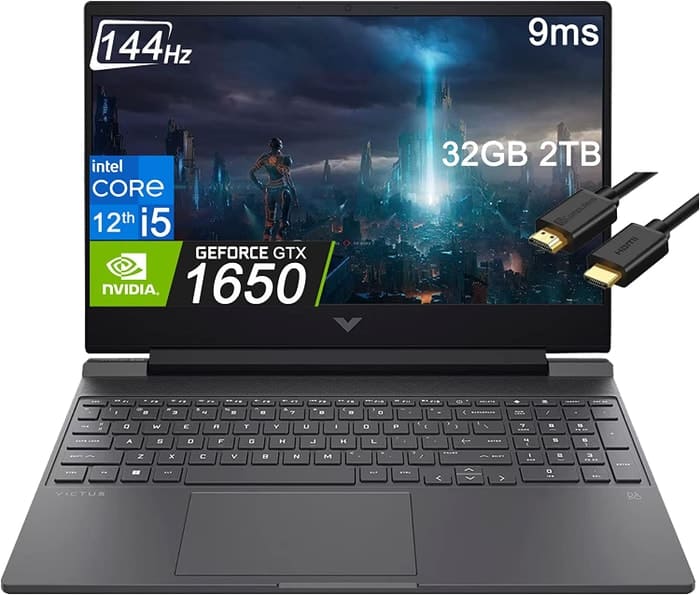
1.HP Victus 15
HP Victus 15: A budget-friendly gaming laptop with respectable specs, but limited availability outside the US.- Excellent price
- Good gaming performance
- Can double as a work laptop
- Bad battery life
- Rather plain design
- Limited availability outside the US
Summary
The HP Victus 15 offers excellent value for its price, with strong gaming performance and the ability to handle routine tasks with ease. While its design may be plain and the battery life subpar, it remains a remarkable option for those looking for an affordable gaming laptop.
Alternatives
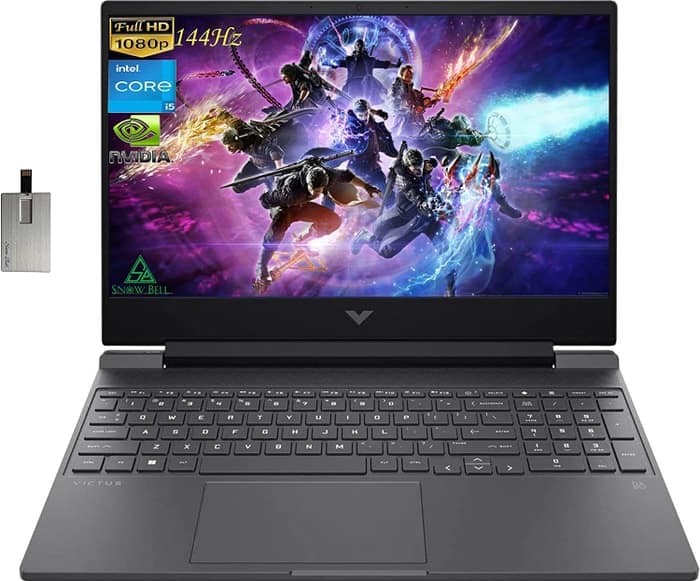
HP Victus
- Delivers smooth gameplay at 1080p.
- Fast SSD.
- No variable refresh rate to reduce screen tearing.
- Slow response time on the display.

2.ASUS TUF Dash F15
ASUS TUF Dash F15: A balanced performer and competitively priced laptop for those on a lower budget.- Lightweight and well built
- Good screen options
- More powerful than previous generation
- Competitive pricing
- Quirks affecting everyday ergonomics
- Ports squeezed together on the left edge
- Be cautious of the FHD 144Hz panel option
Summary
The ASUS TUF Dash F15 is a more powerful and affordable option in Asus's laptop lineup. It offers a lightweight and well-built design, good screen options, and competitive pricing. However, be cautious of the FHD 144Hz panel option and some quirks affecting everyday ergonomics.
Reviews
Alternatives

Lenovo Legion 5i Pro 16
- Stylish, sleek form factor
- Gorgeous display
- Webcam quality is poor
- Lacks biometrics
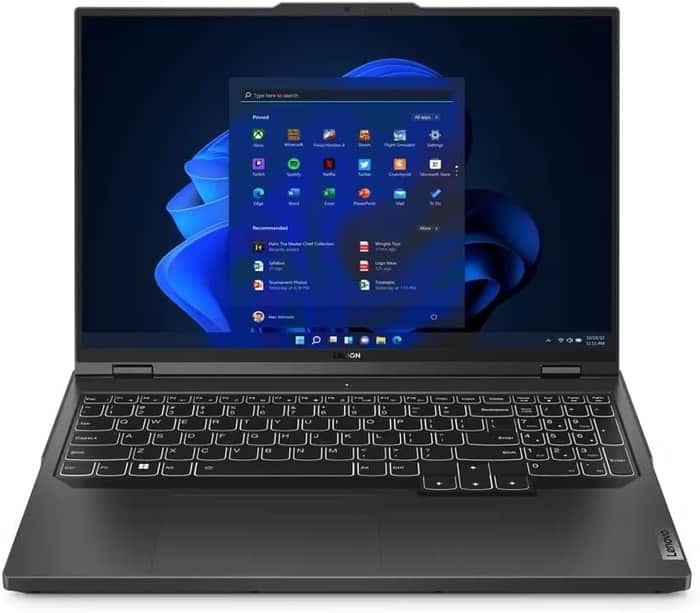
3.Lenovo Legion Pro 5
Lenovo Legion Pro 5 offers good value for its mid-tier price, but falls short in battery life and speaker quality.- Good build quality and design
- Good screen and IO
- Competent CPU with three GPU options
- Competitively priced
- No Thunderbolt or biometrics
- Some obvious hotspots while gaming
- Poor speakers
- So-so battery life
Summary
The Lenovo Legion Pro 5 is a well-built laptop with a good screen and plenty of performance, making it a good value for its mid-tier price. However, potential buyers should be aware of the hotspots in sustained loads, limited battery life, and lacking speaker quality.
Reviews
Alternatives
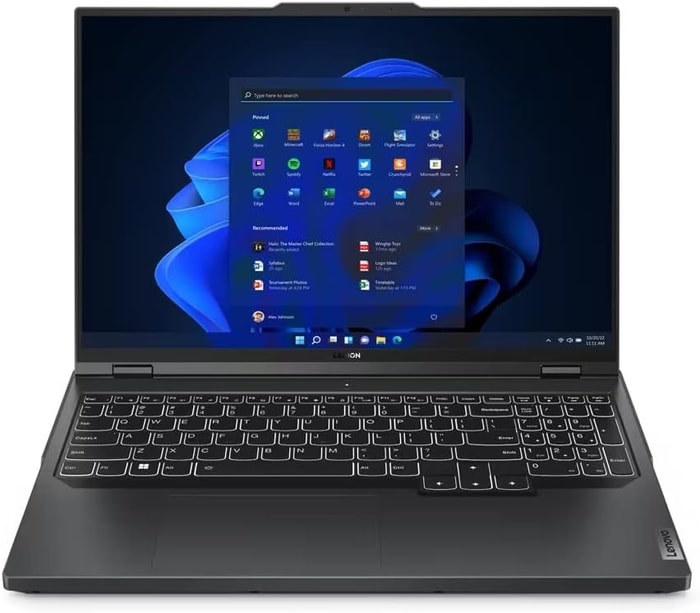 $2,840
$2,840Lenovo Legion Pro 5
- Strong performance for the price
- Quality build and port selection
- Display quality and battery life are just decent
- Bulky and heavy

4.HP Omen 17
HP Omen 17: A high-end gamer's dream with powerful performance and customizable features, but falls short on battery life and noise level.- QHD display with 165 Hz
- Advanced Optimus
- Expandable working memory
- PCIe-4 SSD (space for a second SSD)
- Slightly below-average performance for a RTX 4080
Summary
HP Omen 17 offers top-notch performance with a Core i9-13900HX and GeForce RTX 4090, making it suitable for video processing, rendering, and QHD gaming. The laptop features a QHD display with 165 Hz, individual key illumination, expandable working memory, and Thunderbolt 4 with Power Delivery. However, it falls slightly below-average in terms of RTX 4080 performance, has a high noise level, clattery case, and meager battery life.
Reviews
Alternatives
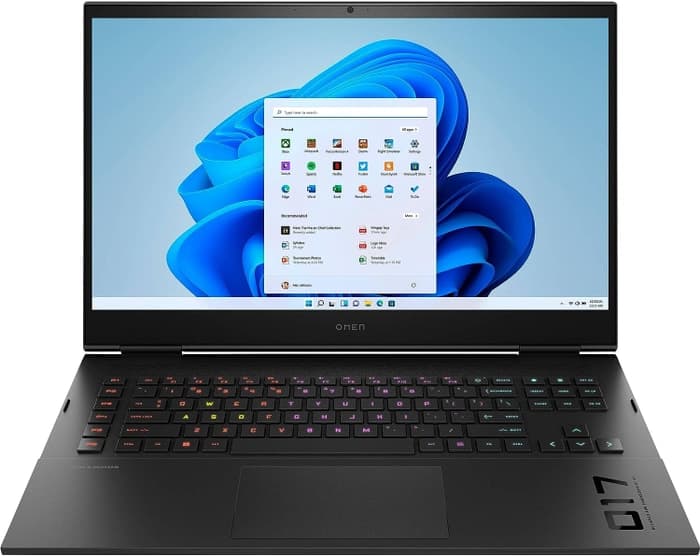
HP Omen
- QHD display with 165 Hz
- Expandable working memory
- Slightly below-average performance for an RTX 4080
Table of the Best Laptops for Assassins Creed: Mirage
| Laptop | Price (approx) |
| HP Victus 15 | $880 |
| ASUS TUF Dash F15 | $1,160 |
| Lenovo Legion Pro 5 | $2,630 |
| HP Omen 17 | $4,290 |





